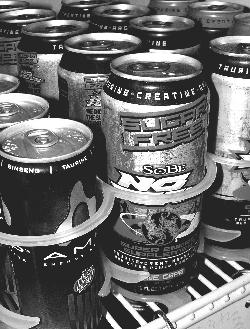 Nicole Jones
Nicole JonesSome people believe that energy drinks are good things to have around. They drink them to help them burn more energy in the gym or to make it through the day. But not everyone thinks that they are such a great thing.
“I don’t drink them,” former NKU student Jessica Avery said. “I think they taste horrible and they aren’t good for you at all. The only one I’ve ever drank is Red Bull, and that was with vodka.”
Energy drinks have surged to the forefront of debate for years. They have been questioned as to whether or not they are truly healthy, or they are bad to ingest.
“I absolutely won’t drink them,” Northern Senior and Medical Student Regina Shirley said. “They are horrible things to put in your body and do nothing good to help you. They do more harm than good, actually.”
Energy drinks are usually sold in places that see high activity from people. They are constantly advertised in gyms and are suggested as ways of letting you get that “extra set of reps” at the gym. You will find them on ball fields and in vending machines. People who play sports and train for them regularly consume them. Former pro wrestling star “Stone Cold” Steve Austin documented in his biography how consuming several of them daily for over 8 months led to a potential heart attack situation.
Less than 24 hours before the final match of his career, he was taken to a hospital when his heart began beating too fast because of all of the caffeine in his system. Almost anywhere that a physical activity occurs, people are consuming energy drinks. However, it has been found that using them does not enhance performance at all. It only increases blood pressure and heart rate.
What the people who consume them may not realize is exactly what they are consuming. Almost every energy drink on the market contains caffeine. Caffeine has been referred to as a “legal drug” in that it is supposed to heighten performance and awareness, just as some “upper” drugs do, yet its legal and sold every day on the market.
In a study conducted at Duke University, results showed that caffeine is responsible for higher blood pressure. Nineteen habitual coffee drinkers were made to wear ambulatory, or moveable, blood pressure monitors, as they went about their day. The study showed that after consuming four or five cups of coffee, blood pressure rose by as much as five points and remained elevated throughout the day. Even though the study was conducted using coffee drinkers, the same general rules apply to energy drinks.
Some use energy drinks, namely Red Bull, as mixers for alcohol. The famed “Jag Bomb,” consisting of Jagermeister and Red Bull, is a popular mix, as is Red Bull and vodka. People drink them together believing that the buzz of the alcohol will last longer than usual. However, recent findings disprove that theory. Studies conducted in Brazil were featured in the September 2004 issue of Alcoholism: Clinical and Experimental Research and found that the use of alcohol with Red Bull did not assist in extending the effects of alcohol on the brain.
“What people don’t realize,” Avery was quick to state, “is that this stuff catches up to you over time. If you use it regularly, it will eventually catch up with you and cause problems, like heart disease and failure later in life…”

